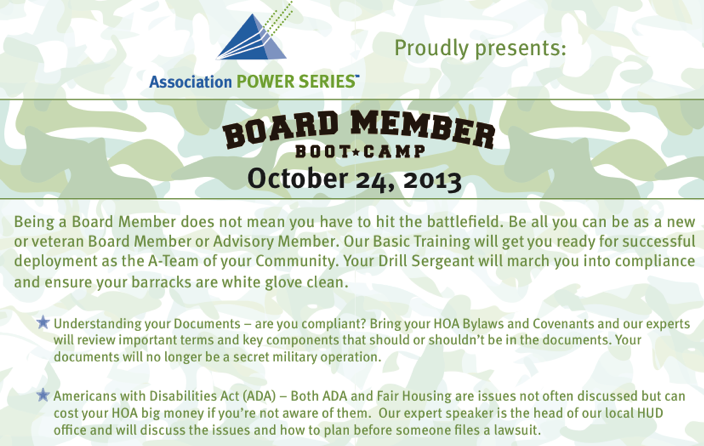Ready Kids Campaign
The Department of Homeland Security’s Federal Emergency Management Agency (FEMA) and the Ad Council are proud to announce the release of a new series of public service advertisements (PSAs) as part of their Ready Kids campaign. This year’s PSAs take a humorous approach to emphasize the importance for parents to involve their children in the preparedness process. Through these PSAs, families are provided preparedness conversation starters including: who to call as your out-of-state emergency contact, where to meet if everyone is separated, and what to pack as part of your emergency supply kit. The PSAs are launching in advance of the tenth annual National Preparedness Month (NPM).
The campaign directs audiences to visit ready.gov/kids for more tips and information about how to get your family prepared.
Amendment to Relieve Developer of Maintenance Obligations Is Improper
Flescher v. Oak Run Associates, Ltd., Nos. 5D12-2575, 5D12-32354 (Fla. Dist. Ct. App. Apr. 5, 2013)
Developmental Rights/State and Local Legislation and Regulation: A Florida appeals court ruled that a developer’s amendment to a subdivision’s restrictive covenants—which relieved the developer of its maintenance obligations—was an improper exercise of its amendment power.
Oak Run subdivision consists of 25 neighborhoods with approximately 3,439 homes. The developer, Oak Run Associates, Ltd., recorded a declaration of restrictive covenants for each neighborhood, which were materially all the same. As part of its development plan, the developer retained ownership and control over all common areas and recreational facilities. Each declaration requires homeowners to pay assessments to the developer for common area upkeep and maintenance, with the base assessment amount for the individual neighborhoods provided in each declaration.
Prior to 2005, the declaration required that annual assessments be collected not only to maintain the recreation and common areas but also to cover community operating costs, such as utility charges, trash collection, security, cable television, roads and drainage facilities. The assessments could include a reasonable amount for reserves, but reserves were not required. The declaration provides that the developer may unilaterally amend the declaration at its sole and absolute discretion.
In May 2005, the developer recorded an amendment to each of the declarations that limited the use of homeowners’ assessments to recreational and common area maintenance. The amendment also removed the requirement that assessments were to be used to fund landscaping, utilities, roads and drainage facilities. Finally, the amendment allowed the developer to retain any unused assessments, effectively preventing the creation of any reserves.
A group of individual homeowners in Oak Run sued the developer, seeking, among other things, to invalidate the amendment. The owners filed a motion for summary judgment (judgment by the court without a trial) with respect to the developer’s authority to amend the declaration.
The owners contended that the developer’s right to amend the declaration was limited by an implied “reasonableness test” and that the amendment was invalid as it substantially changed the character of the subdivision. The trial court ruled against the owners, and the owners appealed.
The Florida courts have previously recognized at least one implied limitation on the right to amend a declaration, which is “that the reserved power be exercised in a reasonable manner so as not to destroy the general plan.” The appeals court also looked to the Restatement (Third) of Property for guidance, which recognizes this same limitation, but “imposes an additional restriction that the developer may not materially change the burdens on the existing community members unless they are apprised of this possibility by the declaration.” Further, the Florida courts have previously held that an amendment to a declaration is impermissible if it brings about a “radical change” which “would create an inconsistent scheme or, a deviation in benefit from that of the grantee to that of the grantor.”
The appeals court held that the amendment was an improper exercise of the developer’s amendment power because it improperly and changes the burdens between the parties. The appeals court found it unreasonable for the developer to collect fees that were intended to cover certain obligations while subsequently eliminating its duty to apply the funds toward those obligations and allowing the developer to keep excess funds.
The appeals court reversed the trial court’s judgment in part and affirmed in part.
Social Media and Kids
More than 60 percent of American teens have at least one social media account. Being online is a good way to keep in touch with friends, but there are people who can use your child’s personal information to steal their identity, bully them, or begin an inappropriate relationship.
Help protect your child from online dangers by following these safety tips:
1. Keep their profile private so that only family and people you know see photos, important dates, and other information.
2. Make sure they’re not posting personal details, including phone numbers, home address, Social Security number, and the name of their school.
3. Only allow them to publish photos and videos that don’t jeopardize their safety or their integrity.
4. Make sure they choose a strong password that can’t be guessed, and that they change it every three months.
5. Never allow them to accept friend requests from people they don’t know.
6. Keep an open dialogue. Ask them to let you know if they’ve received messages from a stranger, or from someone at school who is teasing, harassing, or threatening them. Those could be signs of cyber-bullying or even a sexual predator.
Get additional online safety tips, and other relevant information on OnGuardOnline.gov.











